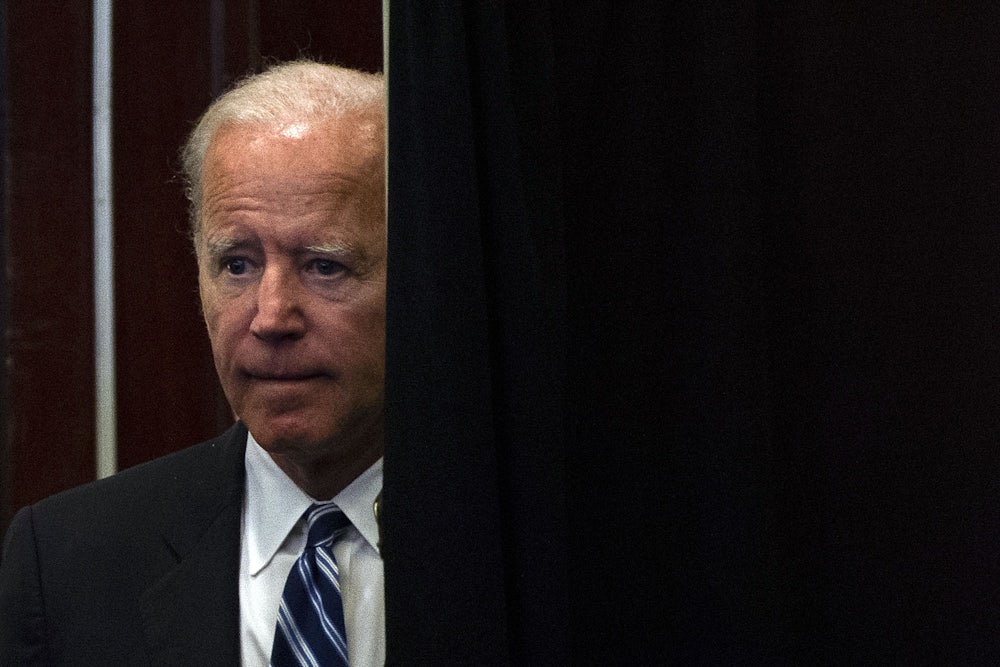It’s finally unofficially official: Joe Biden will announce that he is running for president on Wednesday, according to a report from The Atlantic’s Edward-Isaac Dovere.
Biden enters the race with massive advantages. His eight years as an affable, memeable vice president made him enormously popular with Democratic voters—and synonymous with a political period for which many voters are increasingly nostalgic. He has consistently led in most opinion polls, despite his lengthy dithering over how and when to enter the race, and has—in theory, anyway—advantages both in key early primary states and nationally. And this polling advantage has proved durable despite lengthy examinations of his controversial congressional record on issues like race and finance, as well as a number of allegations of unwanted touching.
The Democratic field is deeper, more diverse, and more crowded than anyone can recall, but Biden and his team reportedly still feel confident. “He sees a clear path down the middle of the party, especially with Bernie Sanders occupying a solid 20 percent of the progressive base, and most of the other candidates fighting for the rest,” Dovere wrote Friday. Biden may have an edge with voters unmoved by Sanders, but the one-time Delaware senator’s confidence belies a political weakness that has hobbled him throughout his career.
First, he famously loathes fundraising. As of this moment (and this seems odd to say about someone who was once arguably the second most prominent politician in the country), money could be a major hurdle. “He doesn’t have any money to pay for any real campaign operations, since he doesn’t have an active campaign account,” Dovere reports. “He’ll be hoping for a show of force, raising a few million dollars in the first few weeks. Without that, he couldn’t even pay for setting up a rally.”
In a section of The Unwinding devoted to Biden’s abusive treatment of former aide Jeff Connaughton—whom Biden regularly refers to as “Dumb Fuck”—during the 1988 Democratic primary, George Packer describes then-senator Biden’s hands-off approach to raising money:
Connaughton was doing the hard, thankless, essential work of soliciting money, and for this he was forever stigmatized, because Biden hated fund-raising, the drudgery and compromises it entailed. He resented any demands placed on him by the people who helped him raise money and the people who wrote checks, as if he couldn’t stand owing them. He didn’t hang out with the permanent class in Washington, but left his Capitol office every evening, walked across Massachusetts Avenue to Union Station and took Amtrak home to his family in Wilmington. Remaining Ordinary Joe became a point of aggressive pride. He was as incorruptible as he was ungrateful.
Connaughton’s work on Biden’s behalf was massively successful: In spite of his boss’s disinterest, he raised $1.7 million in the first quarter of 1987, leading all candidates; by the end of April, he had more than $2 million in cash. But that campaign was quickly derailed by accusations that the candidate had exaggerated his academic record and plagiarized a speech by British Labour Party leader Neil Kinnock.
In 2008, Biden raised just over $11 million, trailing five other Democrats: Hillary Clinton, Barack Obama, John Edwards, Bill Richardson, and Chris Dodd. That quixotic presidential campaign didn’t fare much better than 1988’s—he withdrew after finishing fifth in the Iowa caucuses.
There are early signs that the Democratic primary won’t be the cakewalk Biden expects. Sanders has proven to be a fundraising juggernaut, raking in over $18 million in the first quarter of 2018. Beto O’Rourke and Pete Buttigieg, who can be expected to compete for former Obama donor dollars, brought in $9.4 million and $7 million, respectively. Elizabeth Warren raised a comparatively meager $6 million but has invested heavily in campaign infrastructure in Iowa and New Hampshire.
It is possible that Biden’s disinterest in fundraising won’t hobble him this time out. His name recognition could lead to a rush of early donations and loyalty from Obama donors who haven’t crossed over to backing candidates like O’Rourke, Buttigieg, and Warren. They could fill his coffers without him having to do too much work. Biden, Politico reported last month, “comes out of the gate with a crop of top-tier fundraisers ready to back his bid and other donors willing to cut personal checks to jump-start Biden’s campaign.”
“Though,” the story cautions, “they might wait to throw the full power of their networks behind him.”
But that early, easy support may end up being something of an Achilles heel. There’s a sense of entitlement emanating from Biden’s quasi-campaign. The septuagenarian has wanted to be president since he was a teenager—if Jules Witcover’s fawning biography is correct—but now he believes that he can coast into the White House on a mix of revulsion for its current occupant and nostalgia for the Obama years.
It’s an attitude that could doom his run almost before the starting gun sounds. “I’ve never seen anything so half-assed,” a former Biden aide told Time about the preparations being made for the former vice president’s campaign launch. This general sense of sloppiness and nonchalance will likely contribute to his (sometimes lovable, often not) tendency to speak without thinking. But, if history is any judge, it will also again cause him to neglect fundraising, materially harming a campaign already temporally and ideologically behind most of the others.
